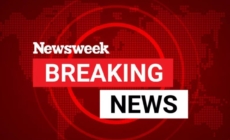-
Multiple Casualties Reported after Car Drives into Crowd in St Louis - 35 mins ago
-
China Hits Back at US Over Nuclear Weapons Alarm - about 1 hour ago
-
Honda and Nissan Unveil Merger Talks as Global Competition Bears Down - about 1 hour ago
-
Donald Trump Taunts Panama: ‘Welcome To The United States Canal’ - 2 hours ago
-
Mets Sign Free Agent Pitcher Sean Manaea to $75 Million Contract: Reports - 2 hours ago
-
‘I Was Destroyed by It’: 4 Men on Abuse at Ireland’s Catholic Schools - 3 hours ago
-
Week 16 Sees Raiders Play Way Out Of Landing Top QB In NFL Draft - 3 hours ago
-
Former WWE Champion Addresses Potential Royal Rumble Return - 4 hours ago
-
Trump and Biden, Make the Hostages Your Priority - 4 hours ago
-
Costco Guys More Popular Than Roman Reigns, Says Former AEW Superstar - 4 hours ago
California proposition results: How voters decided on retail theft, minimum wage

As California voters on Tuesday continue to cast ballots into the evening, they are expected to reverse course on a decade of progressive criminal justice reform, with polling showing overwhelming support for a statewide ballot measure to crackdown on retail theft and the deadly drug fentanyl.
Support for Proposition 36 comes amid rising concerns about crime, homelessness and drug use in the state, an issue seized upon by Republicans and some big-city Democratic mayors during the 2024 election. The initiative reforms a law approved a decade ago through Proposition 47, which reduced some felonies to misdemeanors and was seen as a milestone in California’s attempt to end the draconian tough-on-crimes policies of the past.
Key races at a glance
✓ Winner
Voters also will decide on Proposition 32, a statewide ballot initiative to increase California’s current $16 minimum wage by two dollars for all employees by 2026, a measure that received support from labor unions and anti-poverty advocates but was opposed by influential business interests. Polling has shown that measure could be a toss-up and dependent on voter turnout demographics — young and Black voters are among the likely supporters, according to a recent Berkeley survey cosponsored by The Times.
Californians are expected to shed the last vestiges of Proposition 8, the 2008 voter-approved measure that banned same-sex marriage and was later declared unconstitutional. Proposition 3 would repeal the outdated clause and instead enshrine marriage as a “fundamental right” for all — a precaution that supporters including Gov. Gavin Newsom said was necessary in case of potential conservative Supreme Court rulings.
Proposition 36 was by far the highest profile measure, with millions raised on both sides and so politically tricky that Democratic presidential nominee Vice President Kamala Harris, a former California attorney general, refused to say whether she supported it.
Opinion polls leading up to Tuesday’s election showed strong voter support for Proposition 36 despite warnings from Newsom and the California Legislature’s Democratic leadership, who urged voters to take a cautious approach to the ballot measure, saying it would take away state savings that are allocated to anti-recidivism programs and dramatically increase prison populations.
The growing support for Proposition 36 has alarmed criminal justice advocates, who argued that Proposition 47 helped reduce incarceration and promoted reform, while critics claim it contributed to rising crime rates in the state.
California voters also weighed in on propositions that would affect the state’s climate change response, rent and more:
Proposition 2
This bond measure would authorize the state to borrow $10 billion to modernize K-12 schools and community colleges. The funding is to be used to repair outdated school buildings and to upgrade libraries, heating and cooling systems and broadband internet.
The money from the last successful school bond, passed by voters in 2016, has been spent, and school districts report aging buildings, hazardous mold and leaky roofs.
Proposition 4
This bond measure would authorize the state to borrow $10 billion to help fund the response to climate-related disasters such as drought, flooding and extreme heat. It would also help to ensure clean drinking water. It is the largest investment in combating climate change in California history.
The bond would also be allocated to ensure safe drinking water and wildfire protection. California taxpayers would pay the bond back with interest, with the cost estimated at $400 million a year for the next 40 years, or $16 billion, according to the nonpartisan Legislative Analyst’s Office in Sacramento.
Proposition 5
This measure would make it easier for local governments to approve bonds and tax measures that fund affordable housing and some public infrastructure. Proposition 5 lowers the required vote threshold to approve those measures from a two-thirds supermajority to 55%.
The new threshold would apply to local measures impacting low-income housing, road and transit expansions, parks and wildfire resilience.
Proposition 6
This measure would ban involuntary servitude and end mandatory work requirements for state prisoners. The proposed constitutional amendment is part of a reparations package for descendants of African Americans enslaved in the U.S.
California is one of eight states that still allows involuntary servitude as a criminal punishment. Proposition 6 would end work mandates for state prisoners, instead creating voluntary work programs.
Proposition 33
This measure would allow cities and counties to enact rent control. Proposition 33 repeals a 1995 law called the Costa-Hawkins Rental Housing Act, which generally prohibits local governments from limiting rental rates as issued by landlords.
The measure would give local jurisdictions more power to regulate rent and allowing them to mandate price caps.
Proposition 34
This measure would require that healthcare providers spend most of the revenue they get from federal prescription drug discount programs on direct patient care.
It applies only to a very specific subset of doctors who have spent more than $100 million over a decade on “anything other than direct patient care.”
Proposition 35
This measure would provide permanent funding for Medi-Cal, California’s version of Medicaid, which pays for health services for low-income residents.
Right now, a tax on managed health insurance plans that funds the program is set to expire in 2026.
Source link




















